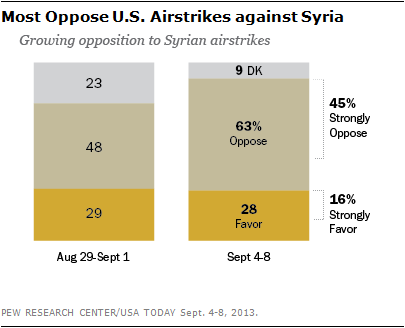
(Source: Pew)
The lobby is reeling.
Reports from Capitol Hill reveal that AIPAC’s big lobbying day for war with Syria changed no votes. Not one.
Meanwhile two of its closest allies, Sen. Ben Cardin and Rep. Henry Waxman changed their position on bombing from “yes” to undecided. Another, Rep. Alan Grayson, is the leader of the “no” forces.
AIPAC should have cancelled its lobbying day when President Obama shifted his position. Its emissaries to Capitol Hill had no message and delivered it badly! They insisted on talking about Al Qaeda as if it was Assad’s ally and not his enemy. And, of course, they kept bringing up Iran.
That is understandable. AIPAC’s entire lobbying effort is about Iran. It cares about the well-being of the Syrian people as much as it does about the people of Gaza. That is, not at all.
No, AIPAC joined the battle to win Congressional approval because resolving the Syria crisis through any means other than war would set a terrible precedent for Iran: resolving the Iran nuclear issue diplomatically.
| The American people do not want to militarily engage in the Middle East again. It has had it. |
In fact, AIPAC itself created the terrible precedent. It invested itself fully on Syria, promising Obama it could deliver the votes, and failed.
The reason it failed can be described as a shift in the zeitgeist. The American people do not want to militarily engage in the Middle East again. It has had it—which is no surprise after Afghanistan, Iraq, Libya and even the democratic collapse in Egypt.
This welcome rejection of military involvement in the Middle East is bipartisan, spanning progressives on the left to the Tea Party on the right, Democrats and Republicans, Jews and non-Jews, pretty much everyone. Even J Street and Israel Policy Forum, which on everything else are in the Obama camp, would not support him on this one.
America is no longer buying what the neocons are selling. As Phil Ochs would say: we aint a marching anymore.
This does not mean a president could not get Americans to support military intervention to defend US interests, including the security of Israel.
What they will not support is the commitment of US military power when there are other alternatives. That is why AIPAC is able to get its various anti-Iran bills and resolutions through Congress.
That is because, right or wrong, Congress views these efforts as alternatives to war. In fact, AIPAC is now pushing new anti-Iran legislation to show that they can still deliver.
And they can deliver. Everything but war. Syria provides the model.
No matter what happens in Syria in the end, no president is going to put it all on the line to thwart a purely theoretical threat from Iran. What he will do is try to eliminate any threat through diplomacy.
Israel should consider doing the same and it might. After all, unlike the lobby, the Israeli people both know war and hate it.
M.J. Rosenberg is a Special Correspondent for The Washington Spectator. He was most recently a Foreign Policy fellow at Media Matters For America. Previously, he spent 15 years as a Senate and House aide. Early in his career he was editor of AIPAC’s newsletter Near East Report. From 1998-2009, he was director of policy at Israel Policy Forum. Follow him @MJayRosenberg.






0 Comments